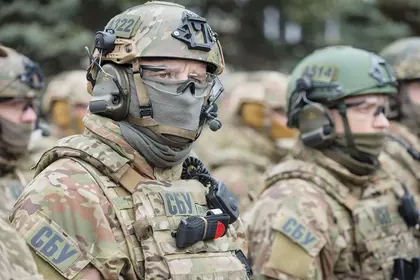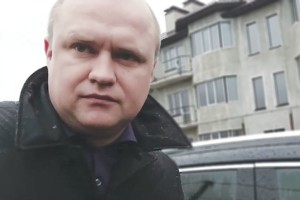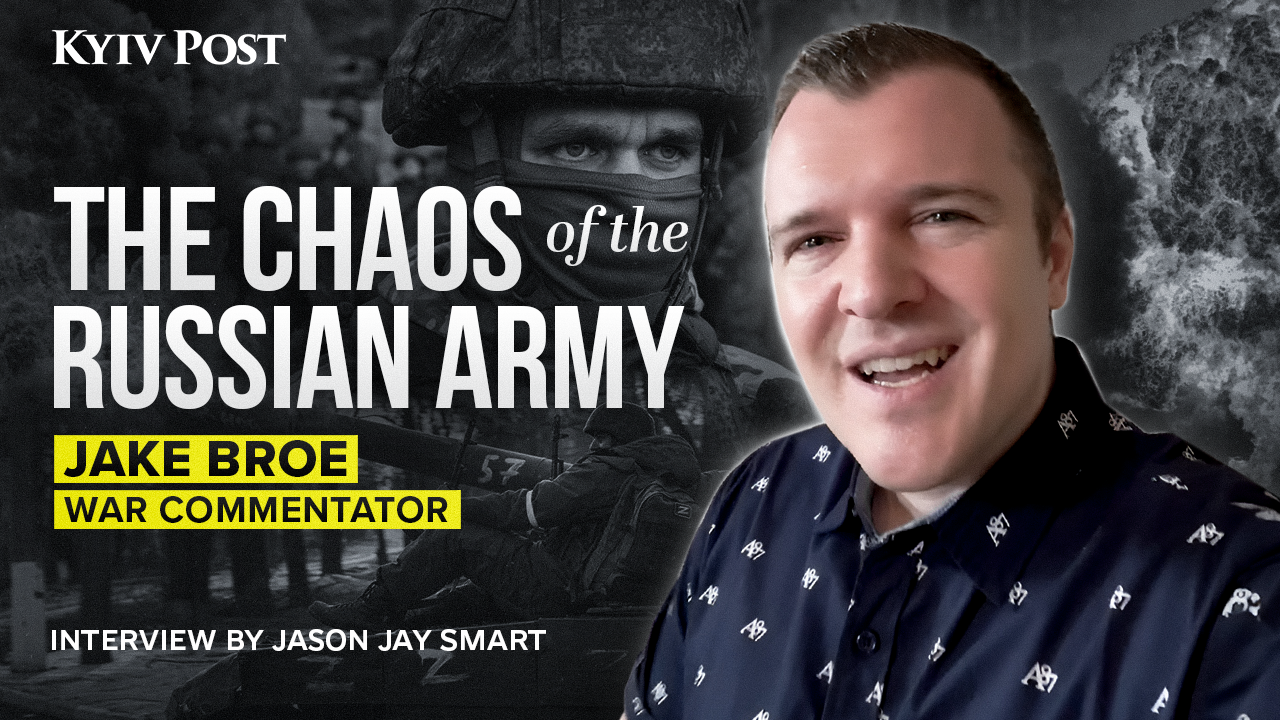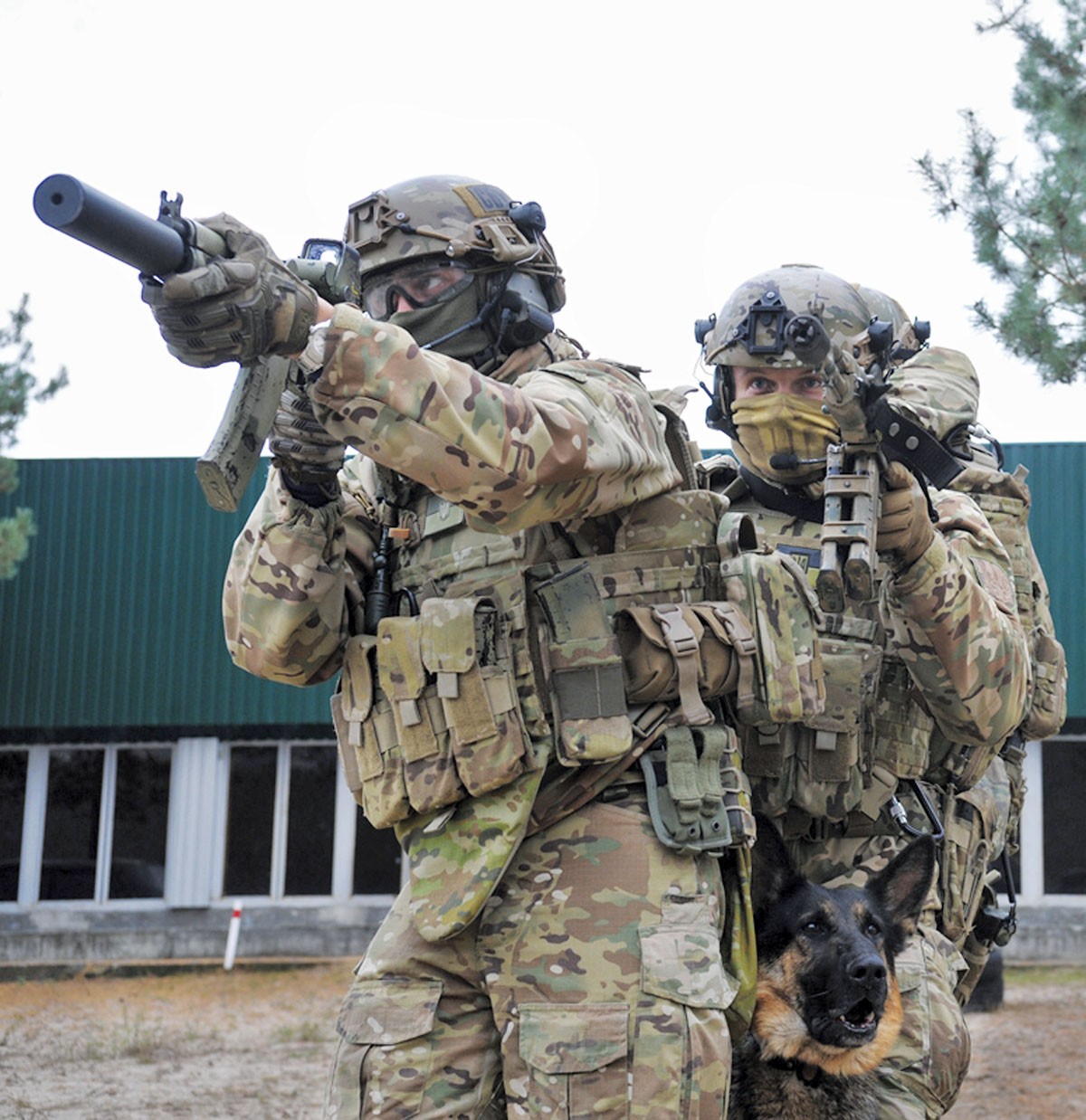See also: Activists say SBU is top human rights violator
See also: SBU officials boast extravagant wealth, but refuse to declare it
Since Russia launched its war against Ukraine in 2014, the Security Service of Ukraine, or SBU, has accumulated massive powers designed to protect the nation. But SBU officials are often accused of using Russia’s war to persecute government critics and enrich themselves.
Activists, businesspeople and international watchdogs say the agency is a tool for President Petro Poroshenko to achieve his political and business goals. The Presidential Administration did not respond to a request for comment.
“Poroshenko sees the SBU as his own fiefdom that he uses to redistribute market shares and persecute political opponents,” reformist lawmaker Sergii Leshchenko wrote in a recent column for weekly news magazine Novoye Vremya.
Shrouded in the secrecy afforded by war, the service has become effectively uncontrollable and unaccountable. SBU employees are blocking access to their asset declarations, while investigative journalists have found plenty of evidence of their extravagant wealth.
SBU spokeswoman Olena Hitlianska refused to answer specific questions and rejected the Kyiv’s Post’s request for interviews with top SBU officials, who command a law enforcement force of 33,500 employees.
“Why did you collect all the garbage that is dumped upon our service?” she said. “… All of this is wrong and is being promoted by paid people, including by those paid by Russia.”
Unreformed
In contrast to other state agencies, there have not even been attempts to reform the SBU since the 2013–2014 EuroMaidan Revolution to reduce corruption and make the service more professional and independent.
One stillborn reform project was developed by the SBU back in January 2015 with the help of the European Union and NATO. The project envisages stripping the SBU of the power to investigate economic crimes and focusing its resources into counterintelligence and counterterrorism.
“Less than 10 percent of the SBU staff is involved in counterintelligence,” ex-SBU Chief Valentyn Nalyvaichenko told the Kyiv Post. “This is critically low.”
Oleksandr Lemenov, an expert at the Reanimation Package of Reforms, said that presidential allies, including SBU First Deputy Chief Pavlo Demchyna, had blocked the reform.
Demchyna is an associate of Poroshenko’s top allies Ihor Kononenko and Oleksandr Hranovsky, several sources told the Kyiv Post. Hranovsky told the Kyiv Post that he knows Demchyna.
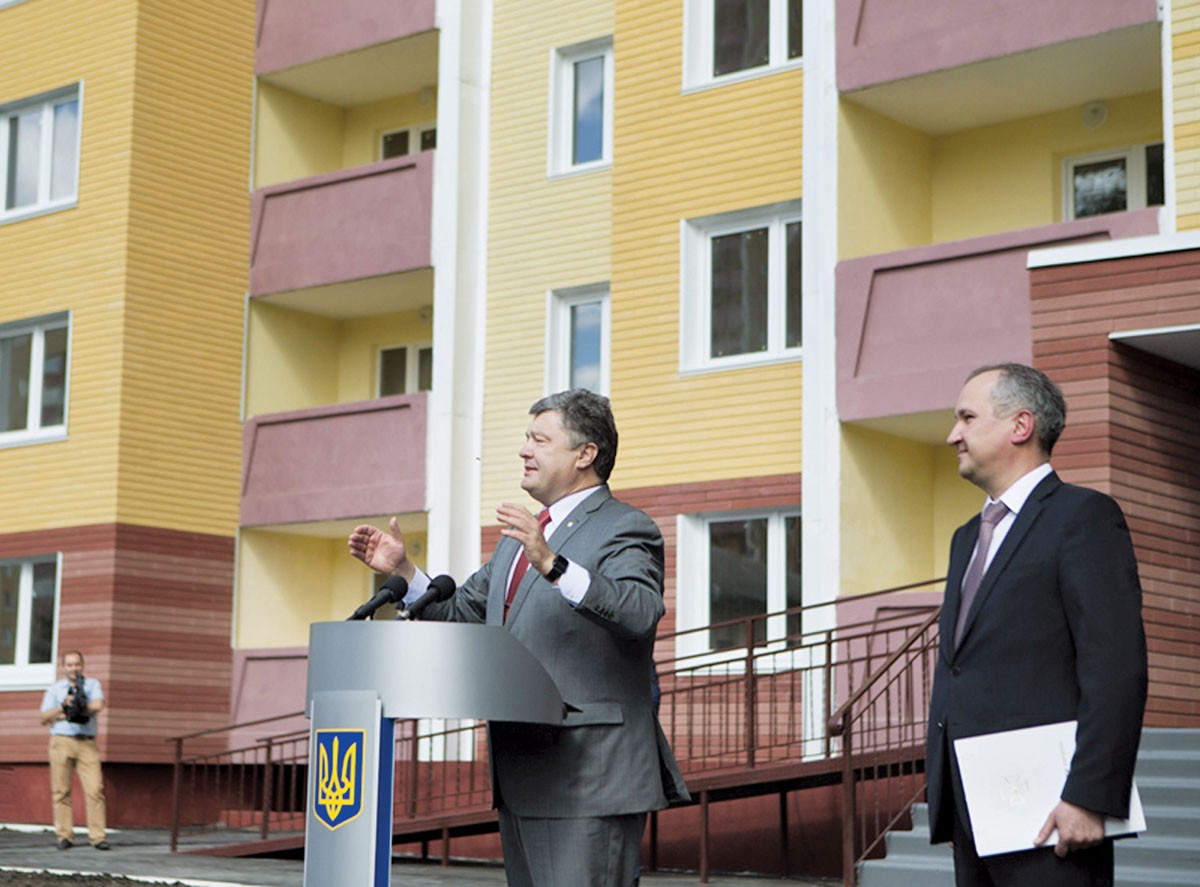
Politicized agency
The SBU faces accusations of cracking down on the government’s political opponents.
“Currently the SBU is a tool of the country’s political leadership,” Viktor Trepak, an ex-deputy chief of the SBU, said in an interview with LB.ua news site in May.
In 2016 the agency opened an investigation into Kateryna Vezeleva-Borisova, a top executive of the National Anti-Corruption Bureau of Ukraine.
The investigation was initiated by Demchyna. The move came amid a bitter conflict between the NABU and presidentially-controlled prosecutors. The SBU accused Vezeleva-Borisova of violating the anti-corruption law by lecturing at the Friedrich Ebert Foundation.
“They set the task of cracking down on someone from the NABU,” she told the Kyiv Post. “Probably they were aiming to cast a shadow of corruption on the NABU.”
In February, Demchyna also initiated a case against former reformist customs official Yulia Marushevska, an ally of Poroshenko’s opponent and ex-Georgian President Mikheil Saakashvili, over an $18 bonus payment.
In March, Marushevska said the SBU and prosecutors had also tried to search her apartment as part of an investigation into her customs reform initiatives that State Fiscal Service Chief Roman Nasirov, a Poroshenko ally and himself a suspect in a graft case, interpreted as corruption.
In 2016 the SBU and prosecutors also searched Odesa Oblast Administration in connection with a case against another Saakashvili associate, Timur Nishnianidze.
Anti-corruption activists have also complained about alleged SBU harassment.
Alexandra Ustinova, an expert at the Anti-Corruption Action Center, said in May that she had been followed by SBU employees and people hired by the SBU.
Lawmaker Leshchenko said in May that he had been harassed by a person who he claims was hired by the SBU.
In April Radio Liberty published evidence of the SBU’s involvement in organizing a protest against Vitaly Shabunin, head of the Anti-Corruption Action Center’s executive board. The SBU denied organizing the protest, but admitted that one of its employees had been present near Shabunin’s house.
“Those who give such orders commit a crime,” Nalyvaichenko told the Kyiv Post, referring to the use of the SBU to attack government critics.
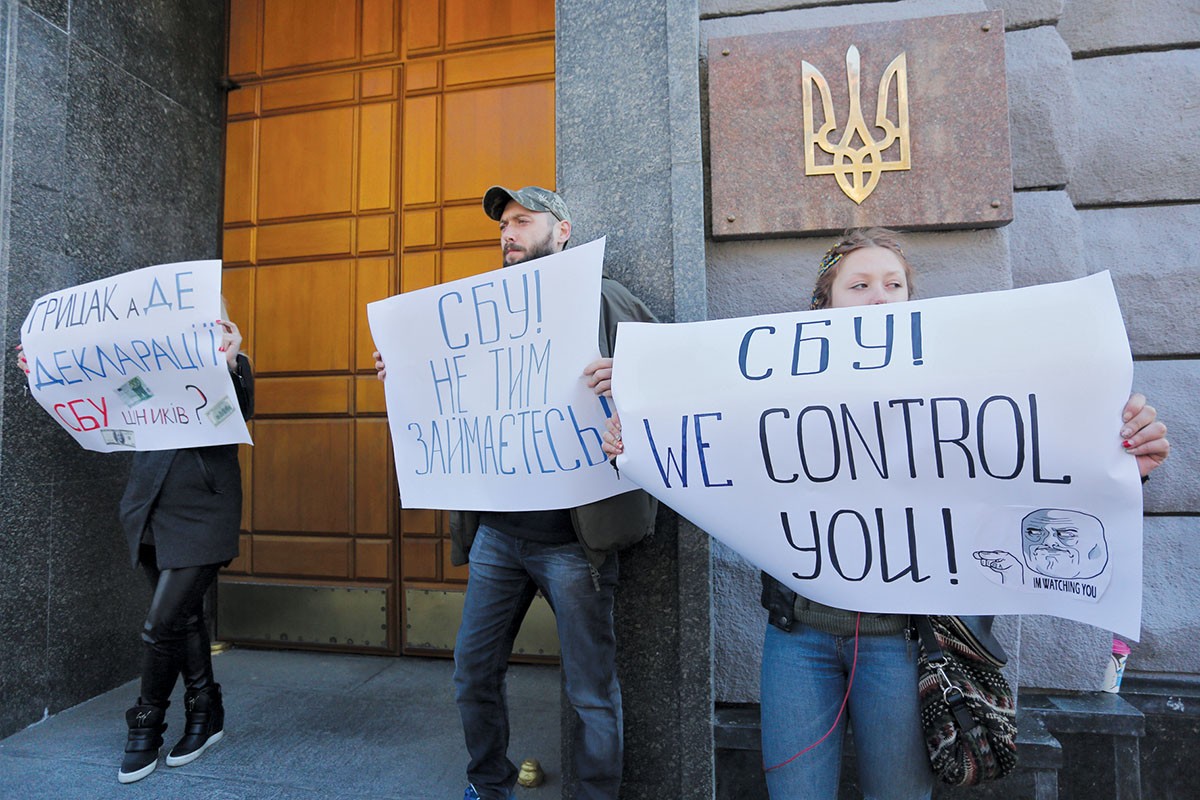
Unfree speech
Russia’s war has become a convenient excuse not only for the persecution of political opponents but also for restricting the freedom of speech, the SBU’s critics say.
In July Vasyl Bedriy, head of the SBU’s Rivne Oblast branch, sent a letter to journalists of the Chetverta Vlada (Fourth Power) investigative journalism project in Rivne, demanding that they send him financial documents detailing the funding they receive from Western donors.
“There were multiple cases when Russian secret services finance public initiatives that secretly conduct anti-Ukrainian activities under the cover of Western European and U.S. non-governmental organizations,” Bedriy wrote, referring to “the sacred duty of every citizen to defend his Motherland.”
Volodymyr Torbich, the chief editor of Chetverta Vlada, said he had started receiving letters from the SBU after a Chetverta Vlada journalist investigated the assets of Demchyna.
Meanwhile, Demchyna has filed 16 libel lawsuits against journalists for investigating his property. Five of them were rejected by a court. No rulings have yet been made in the remaining ones.
In September, the Security Service of Ukraine also started an investigation into the Ukrainska Pravda newspaper, accusing it of divulging a state secret in an investigation on graft in the defense industry.
In 2016 Kyiv Post journalist Vlad Lavrov was attacked while investigating construction in Kyiv on land allocated to the SBU for veterans of Russia’s war against Ukraine. Lavrov found that only 10 percent of the apartments would be given to war veterans and their families, while the rest of them would be sold on the market.
When filming the construction site, Lavrov was attacked by a construction firm executive. Nobody has been held responsible for the incident, and Lavrov is planning to seek justice at the European Court of Human Rights.
In 2015, SBU officers assaulted journalists of the Schemes investigative show who were investigating SBU employees’ luxury cars. The officers detained them and tried to force them to confess to being spies.
The SBU has also initiated bans on numerous websites, citing Russian aggression as justification, and a wide-ranging ban on Russian books, but some of the measures were criticized as disproportionate and aimed at government critics rather than Russia.
In June SBU Chief Vasyl Hrytsak issued a statement lambasting what he called “the fifth column” in Ukrainian media and proposed adopting legislation to introduce criminal penalties for media involved in “hybrid warfare.”
Business unfriendly
Another sphere where Russia’s war against Ukraine could be used as an excuse for abuses is business: The SBU is accused of regularly raiding businesses to extort money from them.
From 2015 to 2016, Demchyna and other SBU officials blocked exports of nuts. Nut exporters and then Odesa Oblast Governor Saakashvili accused the agency of using this measure to extort money from the companies.
In 2016 prosecutors charged Oleh Nazaruk, a deputy head of the SBU’s Rivne Oblast branch, with taking a bribe to turn a blind eye to illegal amber production. Prosecutors filed a notice of suspicion against Nazaruk, but it was subsequently canceled by a court.
Last year the SBU’s anti-corruption unit, headed by Demchyna, also blocked imports of liquefied petroleum gas by 16 independent traders, accusing them of tax evasion and financing Kremlin-backed separatists.
Leshchenko interpreted this as an effort to remove from the LPG market competitors of Nisan Moiseyev, an associate of pro-Russian politician Viktor Medvedchuk, in the interests of Medvedchuk and Poroshenko. The SBU and Poroshenko denied the accusations.
In late March, the SBU raided the offices and apartments of some employees of IT firm YouControl, which runs a database about Ukrainian companies and is used as a source by anti-corruption activists.
The SBU seized computers, documents and money owned by the company’s staff, accusing them of the unlawful sale of equipment and software made by Russia.
“We think for (the SBU) this is a way of extorting money from businesses,” said Antonina Rakhovska, a spokeswoman for YouControl.
In late April the SBU searched eight companies, including Dragon Capital, looking for allegedly Russian-produced software. But Dragon Capital CEO Tomas Fiala said the SBU searches could be an effort to pressure the bank in its corporate conflict over Kyiv’s Sky Mall with Hranovsky, an ally of Demchyna.
“If you are investigating cyber security issues, you need information, which you can copy from a server. You don’t need the hardware. It makes no sense to take away servers,” IT expert Volodymyr Flonts told the Kyiv Post. “If you take away servers, you simply paralyze the company’s work. So it looks to me like a case of racketeering, not an investigation.”
You can also highlight the text and press Ctrl + Enter


